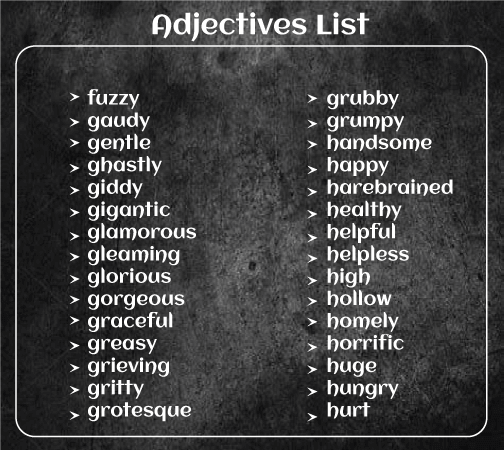Adjective Examples
An adjective is a word that changes the meaning of nouns or pronouns in the statement. In general, an adjective's goal is to characterize a noun or pronoun and provide further details about it.

Definition Of Adjective
The adjective is a part of speech utilized to alter or characterize the quality of a noun or pronoun. In other words, describes, identifies, and quantifies words to modify nouns or pronouns.
An adjective, as defined by Merriam-Webster, is "a word pertaining to one of the major form classes in any of numerous languages and usually serving as an emulsifier of a noun that indicates a quality of the thing identified, show its quantity or extent, or explain a thing as distinct from something else."
As an example,
- I have seven chocolates in my purse. (How many are there?)
- I adore that red flower.(Which one...)
Adjectives respond to questions like "What kind?" "Whose is it?" and "Which one?"
Let's look at two examples of adjectives to see how they work. The first statement contains no adjectives, but the second contains two.
- Leela purchased a bag at the marketplace.
- Leela purchased a black bag at the busy street.
The second phrase informs us that the bag Leela purchased was black in colour and that the shop she visited was on a busy street. Both of these expressions are acceptable. However, the second statement has more detail than the first.

Adjectives are employed in sentences and clauses in two ways:
1. The adjective is placed exactly next to the noun/pronoun it modifies.
Adjectives usually appear before the nouns/pronouns they modify, although they can also come after them.
- The purple flowers are blooming.
(The word purple changes the noun flowers)
- She is waiting for someone else
(the adjective else changes/alters the pronoun, someone)
2. The adjective comes after a connecting verb and serves as a subject complement.
The mansion is old. (The adjective old comes after the linking word is.) As the statement's subject complement, old changes the word mansion.)
In either situation, numerous adjectives can be used to alter the same nouns or pronouns.
- It had been a long and rainy night.
- My small, lazy kitty is named Fella.
- The mirror was bent, shattered, and filthy.
When many adjectives have been used just before the noun or the pronoun, they usually go in a precise order.

Adjectives list
There are a myriad of adjectives. The following is just a small set of several, numerous adjectives that exist:
- happy
- embarrassing
- tall
- delicious
- uncomfortable
- clumsy
- sad
- black
- brave
- smart
Adjective examples in sentences
The following sentences demonstrate how we use adjectives:
- Gaurav is a wise man.
- The large basket is brimming with red apples.
- The race was won by the cautious turtle, not the arrogant rabbit.
- The old timepiece had malfunctioned.
- The plot of the disguised villain was foiled by the courageous, groovy youngsters and their silly, timid dog.
- Leena wore a pretty dress.
- They reside in a big apartment.
- Lisa has beautiful hair.
- The birds are blue in colour.
- The glass is sparkling and shining.
Comparative Adjective
Comparative adjectives evaluate the distinction between the different objects they change. They are used in phrases that compare two nouns.
Comparative adjectives are used to say that one individual or item displays a higher level of quality or is a better indication of a quality than another.
Comparative adjectives include words like bigger, wiser, and faster.
Comparative Adjective examples
- This residence is bigger than the original one.
- This rose is more magnificent than that.
- She is taller than Mr John.
- Thomas is more clever than this kid.
- Jon is the most attractive guy in college.
- This is the prettiest outfit in the shop.
- I misplaced my most comfy sneakers.
- My profession is worse than anyone else's.
- Your desk is messier than Sheena's.
- He is the coolest guy in society.
Superlative Adjectives
Superlatives are utilized for comparing more than two things or persons by showing which is most superior or extreme.
Some of the examples of Superlative Adjectives are;
- Anna is the quickest stenographer in the section.
- Of all the buildings, this is the
- The teachers are trying to find out the least difficult way to make the students understand the algorithm concepts.
- Cheetah is the fastest animal of all.
- Sheena is the laziest girl of our class.
Coordinate Adjectives
Coordinate adjectives are adjectives that act together to alter the same noun. They can be distinguished by a word and or by commas.
An adjective phrase is formed by using a phrase containing many adjectives that alter the same noun.
- Yesterday, she donned an orange and black shirt.
- It was a vibrant warm, and beautiful morning along Juhu Beach.
- The book was lengthy and tedious.
- These pajamas are adorable, cozy, and reasonably priced.
Compound Adjectives
Whenever two or more adjectives combine together to alter the same noun, a compound adjective is generated.
To minimize confusion or ambiguity, these nouns should be hyphenated. Though it is not always necessary to hyphenate.
Compound adjective examples
- They have a four-foot balcony.
- Diana works part-time.
- Be cautious of the green-eyed bird
- He is a cold-blooded individual.
- We came across a man-eating crocodile!
- Daniel's dog is well-mannered.
- Visitors have to be open-minded concerning thoughts.
- This is a short-term course.
- Cities have fast-paced life in comparison to villages.
- It proved to be a low-stress position.
Demonstrative adjectives
The demonstrative adjective is used when two or more individuals or objects are mentioned, and the writer wishes to be explicit about which person or item is being referred to.
In a phrase, demonstrative adjectives are employed to indicate a specific noun or pronoun. Here are some instances of demonstrative adjectives in use.
Demonstrative Adjective Examples
- This dog bit my fingers, but that dog stared at my feet.
- These clothes have been cleaned, but those are still filthy.
- Please give me that blue notebook
- I want those sparkling stones.
- This is my favourite movie.
Distributive adjectives
A distributive adjective refers to that implies to specific participants of the group.
For instance, in the statement, the term each is a distributive adjective. Each individual got their own meal. In the statement, the term every is also a distributive adjective. He tossed a bone to every dog in the park.
Distributive adjective examples are;
- Each chair has five people seating.
- It poured every day when I was in Shimla for five days.
- Every table was occupied.
- Every week, I go to the cinema.
- Every fourth year, a leap year occurs.
- At the carnival, every individual wore a mask.
- I run barefoot every
Denominal Adjectives
A denominal adjective in English grammar is an adjective generated from a noun, generally with the inclusion of a suffix, such as worthless, earthen, stupidly, foolish, and so on.
Denominal Adjective Examples are;
- This is a difficult mathematical riddle.
- He has a biological test tomorrow.
- He gifted me an archaic wooden ship.
- I decided to marry an American woman.
- The Jewish population in New York is sizable.
- Maria has an exquisite assortment of Russian dolls.
- Wear thick woollen clothing in the wintertime.
- The polar bear is classified as endangered.
Adjective of Quality and Quantity
Adjective of quantity can be defined as "Adjective of quantity specifies the amount or estimated amount of the noun or pronoun in the phrase."
It does not provide exact amounts; instead, it conveys the amount of a noun in relative or full terms.
Quantity adjective examples are;
- Helen consumes a whole apple every day.
- Yesterday I ate some potatoes.
- He knows very little about this endeavour.
- He will spend all of his earnings on you.
- The glass contains no milk.
- The exam was passed by all of the pupils.
Whereas adjective of quality specifies the quality of the noun or pronoun.
Quality adjectives examples are;
- He is an honest man.
- That Russian woman was very beautiful.
- Bitter gourd tastes bitter.
- Rama had a blue pen.
Order Of Adjective
Adjectives denoting qualities are most often placed in a definite order in numerous languages. Most often, the order of adjectives in English Grammar is as follows:
- Quantity or number
- Quality or opinion
- Size
- Age, shape, colour
- Appropriate adjective (often nationality, another place of origin, or material)
- a reason or a qualifier
The order of adjective examples are as follow;
- I adore a really small new red antique scooter that remains standing at the end of the road.[quality - age - size - colour - proper adjective]
- My brother has a huge gorgeous black and brown [size - quality - colour - colour]
- A spectacular archaic Spanish [opinion - age - origin]
- A small round brown [dimension - shape - colour]
- An unattractive purple steel [opinion - colour - material]
- I have ordered few sleek new American [dimension - age - origin]
- A fantastic new Spanish [opinion - age - origin]
- I purchased a pair of brown suede [colour - material]
- They reside in the big yellow, white and blue [Size-color - material]
- My colleague lost a pink, black and blue glass [colour - material]
Adjective Phrases
Adjective phrases are one of several types of phrases that you employ in your speech and write-ups on a daily basis. Adjectives are used to characterize nouns.
Adjective phrases are used to characterize adjectives. Finally, adjective phrases
enrich sentences by providing more vivid descriptions for nouns.
A phrase which works as an adjective by describing the noun is referred to as an adjective phrase. like becoming more angry; taller than the brother
Examples of Adjective Phrases are;
- Someone wiser than me should sort this out.
- Everyone was absolutely thrilled when the champion was declared.
- Aunt said the price of a vehicle is way too high.
- Faster than a speeding bullet, Superhero ended up saving the day.
- Her eyelashes were amazingly mesmerizing to the teenage boy
- The film was not too horrible
- The summative assessments were unbelievably difficult.
- This pizza is very tasty and incredibly costly.
- The new wardrobe was very expensive but really gorgeous.
- The dance performance was exquisitely elegant.
- The spoilt food tastes awfully terrible.
Participle Adjectives
They are identified by their ends, which are usually -ed or -ing, as is the case for most participles regardless of what part of speech they signify.
Participle adjectives acquire their name from the fact that they finish in a participle (-ed, -ing)
Participle Adjective examples are as follow;
- We had such a long, boring journey.
- I like reading interesting journals on history.
- Many individuals find spiders frightening.
- It was an annoying show; I didn't enjoy it.
- He is playing a complicated character in the movie.
- I am too excited to start my journey in a new town.
- The tempting apple pie made my mouth water.
Interrogative Adjectives
These are words utilized with the nouns to pose queries.
Examples;
- Which bike should we take?
- What rank have you received in this contest?
- Whose scooter is parked here?
- Which is your favourite dessert?
- What is the time of seminar?
- Whose water bottle is lying on the floor?
Possessive Adjectives
Possessive adjectives are used with nouns to indicate that something pertains to someone. It is an adjective to showcase possession. These have a singular and plural form for nouns.
- My brother lives in Patiala
- Your court proceeding is in room 502
- His sister lives in Srinagar..
- Her name is Jennifer
- This market is famous for its artifacts.
- Our parents are dance teachers.
- Their class is next to mine.
- The place is famous for its mangoes.
- Is that your pen under the table.
- Her hair are blonde.
Indefinite Adjectives
Indefinite adjectives define nouns or pronouns in a broad sense. Few, many, no, several, and some are examples of indefinite adjectives.
- Few people make it to this point.
- Do you currently have many vacancies?
- This library has no books.
- I looked through several sources.
- There are still some tickets available.
- I read through several articles through out the day.
Adjective Examples
The adjectives have been highlighted in the examples below for your ease of recognition.
- Have you got the latest match information?
- There is humid feeling in the atmosphere due to excessive rainfall.
- He had lost his few pals.
- My outfit is better to yours.
- She is older and wiser than her brother.
- In this city, Nora is a strong woman.
- On the box, Robert observed a yellow ribbon.
- Her friends describe her as a bashful girl.
- He has a charming personality.
- He gambled away what little money he had.
- The conference drew only a few males.
- Angel Fall is a spectacular waterfall in Venezuela.
- Your pencil is better than mine.
- Julia is the most attractive student in the class.
- Tommy is the area's tallest male.
- Shakespeare was the greatest poet in the nation of England.
- This is the smallest flower of all.
- The fabric touches coarse.
- My home is large and well-kept.
- This cup contains less water than I require.
- Well-being is preferable to money.
- James has beautiful features.
- He is the wisest of all of her siblings.
- He went to the hospital after experiencing a strong pain in his left hand.
- I have no further remarks to add.
| 


 For Videos Join Our Youtube Channel: Join Now
For Videos Join Our Youtube Channel: Join Now









